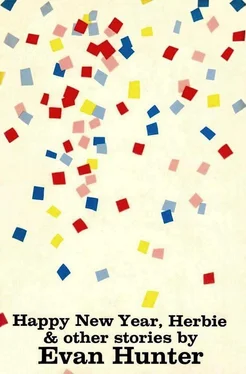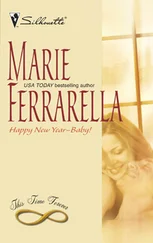Epman’s blue eyes twinkled as if he were about to reveal the secret of birth to a pair of atheistic obstetricians. The eyes were overhung with thick, unruly black eyebrows that seemed determined to compensate for the lack of hair on his head and the sparse look of his mustache. The brows would have been menacing were it not for the warmth of the blue eyes. It was, perhaps, the eyes that had first convinced me there might be some worth in a project which seemed patently ridiculous on the surface.
“With writers there’s no real competition,” Epman explained, pleased with his analysis. “Writing is the one business — profession, excuse me — where it don’t matter how many best sellers there are. Does it hurt David Cohen the people should also be buying a book by Peter Wainwright? This ain’t like a cap pistol where you got one you don’t need another. Books you always need. In fact, you read one good one, it makes you want to run out and buy another one. So there’s no real competition. Oh, yes, maybe it burns you up a little some other writer’s book is number three when your book is only number four, but there’s no real competition; you write the best book you know how and then you leave it to God. You don’t have to get out there and fight with your teeth and your nails to hang onto whatever little piece of the earth you finally managed to get.”
Epman’s hand leaped from the vest pocket, violently stroked the end of the mustache, and then fluttered down again.
“So with no competition, it ain’t necessary you should know other writers. In fact, it’s a little bit of a pain in the ass. What do writers want to talk about? Writing, what else? So it’s supposed to be fun to listen to another writer tell you all about his new plot? This is fun?” He shook his head. “Writers avoid other writers. Oh, they know a few, yes. This is only to keep up appearances, people shouldn’t say they’re anti-social. But how many dentists do you think have friends who ain’t in the dental profession? Maybe three or four, and they’re already old cockuhs who are ready to drop dead. Dentists stick with dentists, doctors stick with doctors, pimps even they stick with other pimps. Writers, their best friends are their typewriters.”
Sam Epman smiled. He had a wide mouth which, when possessed by a smile, seemed to claim his entire face. “So,” he said, “David Cohen, meet Peter Wainwright.” He smiled again. “You’re both so talented, when you shake hands short stories should come popping out of your ears.”
Wainwright and I, prompted by Epman’s cue, shook hands, but nothing popped out of our ears. Wainwright was wearing a black suit and a black tie, and he gave a tailored impression of a man honed to knife-edge perfection. Dark suit, dark hair, dark eyes, I thought, a cautious smile and a firm handclasp, first impressions of Peter Wainwright.
“Glad to meet you, Dave,” Wainwright said, and I added to the impression a deep, well-modulated voice and a person who immediately placed a total stranger on a first-name basis. “I read your book. It’s an excellent job.”
“Thank you,” I answered. I could not say I had read or enjoyed any of his books because I’d never been tempted to crack a single one of them. Nor could I bring myself to call this dark, lean stranger Peter or Pete or Petey or, in the face of his earlier familiarity, even Mr. Wainwright. Feeling completely inadequate, I settled for the two words “Thank you” and a manly handclasp and hoped I appeared neither foolish nor aloof.
“I got the title for the picture,” Epman said suddenly, interrupting a handshaking scene that was becoming awkwardly incessant. “You remember when I talked to you at the Waldorf in New York, I didn’t have a title. Then I only knew I wanted to do Julius Caesar , but I also knew Julius Caesar we couldn’t call it. If you bring Julius Caesar up to date, you don’t still call it Julius Caesar , do you? You also don’t call it Big Julie or something like that. This is the one thing you don’t call it. This picture has got to have class, so you don’t start with Hollywood craperoo. I know Hollywood craperoo from the time I was eighteen years old and running inter-office memos for Irving Thalberg.”
“Did you work with Thalberg?” Wainwright asked in his deep, well-modulated voice. He leaned forward in expectant interest, his brown eyes alert in his narrow face, his brows raised in anticipation.
“I worked with all of them. You name them, I worked with them. All the big producers, the directors, the stars, you name them and I worked with them. You talk about competition — the picture business got competition like the World Series.” His hand came up to stroke the mustache. “But I’m still alive and kicking, thank God, and I got enough dough to be an independent and to pay the talent I need to make a class movie. Gentlemen, this picture ain’t going to be a Metro musical or a Warner Brothers gangster epic, and it ain’t going to be either a thing where some smart jerk buys a best seller and then hires a screen hack for fifteen hundred bucks a week he should louse up the story by sticking in it original ideas he never had in his life. This is going to be class, which is why I hired talents, not hacks, talents who are capable of thinking original, who can take a play like Shakespeare’s Julius Caesar which has withstood the test of time for what — three centuries? — take this play and translate it into English which the average moviegoer, Mr. and Mrs. America, can understand without we have to put titles on the bottom of the picture to translate from the blank verse.”
I glanced at Wainwright, but he seemed completely absorbed by what Epman was saying. I felt again the twinge I’d first felt at the Waldorf last month when Epman initially outlined the project.
“Did Shakespeare write in Latin?” Epman asked now, as he had asked that day last month in his Waldorf suite. “No, he wrote in Elizabethan blank verse, and the people who watched his plays were used to listening to this blank verse and to understanding it. This was a language that was immediately understood by the crowd that had come to the Globe Theatre to be entertained. So Shakespeare entertained them. He stole these solid plots from sources God knows where he found them, from Plutarch, from Thomas Lodge, from Fiorentino — anybody who ever put a good story on paper, Shakespeare swiped it. In those days there were no copyright laws, gentlemen, he saw something he liked, he grabbed it. The son of a bitch never had an original plot all the time he was living. And he took these plots and wrote this glorious poetry around them, but is it the blank verse that plays today, or is it the construction of the plays, the fire they’ve got underneath all that poetry? I’ll tell you what it is.”
Sam Epman lighted a cigar and passed the box around. Both Wainwright and I refused. Sucking on the cigar, Epman said, “It’s the story. Story, that’s the secret. Poetry is great for English literature courses; am I trying to take away from this glorious poetry the man wrote? But poetry don’t sell tickets. In Elizabethan times, yes, it sold tickets because it was the language they understood. Today the people don’t understand it. It detracts from the play; it detracts from the psychological penetration this man Shakespeare had. It detracts, to put it in terms you writers understand, it detracts from the universality.”
“What the hell is Julius Caesar if not universal? What is this, the story of a dictator? The story of a band of patriots? Baloney! This is the story of a power grab, that’s what this is the story of. You can set this story in a New England factory town, and it will still play. Why? Because man has been concerned with power from the minute he discovered he could hit another man on the head with a club and take away his woman and the saber-toothed rug from his cave. Power and success, what the hell is Julius Caesar all about if not that? And what is life today all about if not power and success? Today there’s no cavemen to kill. Today you got to kill some son-of-a-bitch account executive. Today, when you make your grab, you don’t get Gaul; you get maybe the right to tell people how mild Chesterfield cigarettes are, but this is a piece of the world, this is what buys you that Cadillac or that Mercedes, this is what puts that luscious blonde on your arm, this is what pays for those hand-tailored suits. Don’t kid yourselves, it’s the same today as it was then. Today you don’t use daggers; you use words and smiles, but you’re bucking for the same thing: power! And you can equate that with success, and that’s where we grab Mr. and Mrs. America by the genitals, because success or failure, power or lack of power is something they live with every day of their lives.”
Читать дальше












